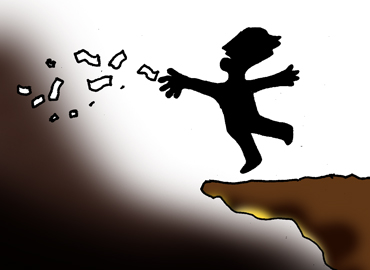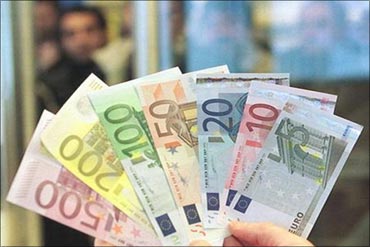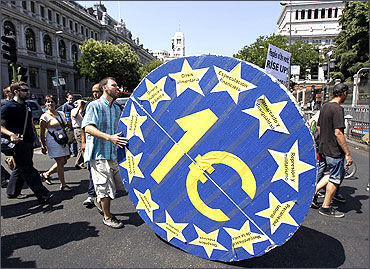
"So how was your holiday?" asked my roommate, early in the morning.
"Pretty good!"I replied. "Came back late in the night when you were already asleep. It is always great celebrating pujo at home."
"Yeah."
"Ma has sent some sondesh for you. It's in the refrigerator."
"Wow," she said, getting and leaping towards the fridge.
"So how are things with you?"I asked, as soon as she came back munching sondesh.
"Pretty good. And in your absence I have been following the crisis in Europe pretty closely."
"I am impressed."
"In fact, the German Chancellor Angela Merkel and the French President Nicolas Sarkozy are expected to meet on October 23, 2011, and announce further rescue plans of the European economies that are in trouble. Also, the next tranche of loans to Greece amounting to $8 billion have been cleared and will be disbursed by early November, 2011," she said.
"I see you have been following things in great detail."
Click NEXT to read on . . .

"Yes. Also there are plans of expanding the European Financial Stability Facility, the Euro 440 billion rescue fund."
"Yes. I read that."
"So what do you think?" she asked.
"About what?"
"All these rescue efforts."
"They will come a-cropper," I remarked emphatically.
"Why do you say that?"
"Take the case of Greece, which everyone is trying to rescue. Greece has a history of being addicted to foreign capital. As Louisa Gouliamaki wrote in a recent column, 'Even in the best of times Greece cannot function as a developed, modern economy without hefty and regular injections of subsidised capital from abroad. This is primarily why Greece did not exist between the 4th century BC and the 19th century'."
"But how did things pan out more recently?" she interrupted.
"Well, here's what Gouliamaki further wrote: 'After modern Greece was established in the early 1800s, those injections came from the United Kingdom, which used the newly independent Greek state as a foil against faltering Ottoman Turkey. During the Cold War, the United States was Greece's external sponsor, as Washington wanted to keep the Soviets out of the Mediterranean'."
"You are still stuck with history."
Click NEXT to read on . . .

"So foreign capital has always been easily available. Since Greece started to use the Euro as its currency, it started borrowing at low interest rates. This was primarily because the Euro inherited the strength of Germany and the Deutsche Mark. So Greece could also borrow at interest rates close to the rates at which Germany could borrow. This led to a huge borrowing binge in Greece by the government and, to some extent, the private sector as well"
"What are you trying to suggest?"
"The feeling at least in Greece is that whatever we might do, some foreign guy will come and rescue us. As Martin Wolf, a columnist for Financial Times wrote in a recent column, 'It is likely that after such a rescue, the imprudent will just go back to their bad old ways, making further rescues necessary'. So if you keep rescuing Greece, the feeling there will be that come what may, we will keep getting rescued and that in turn would mean that Greeks will keep practising profligacy."
"So it's a mess," she interrupted.
Click NEXT to read on . . .

"Yes. As Gouliamaki points out, 'No one has a geopolitical need for alliance with Greece at present, and evolutions in the Eurozone have put an end to cheap Euro-denominated credit. Greece is therefore left with few capital-generation possibilities and a debt approaching 150 per cent of its GDP. When bank debt is factored in, that figure climbs much higher. This debt is well beyond the ability of the Greek state and its society to repay'."
"But why will they unable to repay?" she asked.
"For the simple reason that there is way too much to pay back. As hedge fund manager Puru Saxena wrote in a recent article, 'In Greece, government debt now represents almost 160 per cent of GDP (his estimate is slightly different from the earlier estimate) . . . its interest costs alone will amount to approximately 24 per cent of GDP. In other words, nearly a quarter of Greece's economic output will be gobbled up by interest repayments! Looking at this simple math, it is obvious to us that unless the Germans or the French comes to its rescue, Greece will default'."
Click NEXT to read on . . .

"But they can always grow their way out of trouble, can't they?" she persisted.
"Let me quote something that economist Bill Bonner wrote in a recent column: 'Greece, a small country with a small GDP and no oil . . . its strategic export is olives . . . and its last real military victory was the Battle of Jhelum in 326 BC, in which Alexander the Great defeated an Indian Rajah named Porus'. They just don't have the resources to grow out of trouble."
"I am still not convinced!"
"Okay. Let explain it in another way. How can a country repay its debt?"
"By earning money."
"How can a country earn money?"
"By exporting stuff and selling merchandise in the domestic market."
"As we have seen the country's main export is olive. And how much money can you make by exporting olives. Plus the domestic market of Greece is way too small," I said.
"Fair point."
Click NEXT to read on . . .

"There is another point to the entire argument, something that bestselling author Michael Lewis talked about in a recent interview. 'If you put Germany together with Greece in a single currency, it's a little like watching an Olympic sprinter and a fat old man running a three-legged race. The Greeks will never be as productive as the Germans, and the Germans will never be as unproductive as the Greeks', said Lewis."
"What do you mean by better productivity?" she asked.
"In simple English it means producing things using fewer resources. John Mauldin and Jonathan Tepper further explain this point in Endgame -- The End of the Debt Supercycle and How it Changes Everything: 'Since the beginning of the Euro in 1999, Germany has become some 30 per cent more productive than Greece. Very roughly, that means it costs 30 per cent more to produce the same amount of goods in Greece than in Germany. That is why Greece imports $64 billion and exports only $21 billion. What needs to happen for Greece to become competitive. . .? Labour costs fall by a lot, and not by just 10 or 15 per cent... In short, Greece lifestyles are on the line. They are going to fall. They have no choice. They are going to willingly have to put them into a severe recession or, more realistically, a depression'."
"That explains it. But I have another question?"
"Shoot!"
Click NEXT to read on . . .

"What you are essentially saying is that Greece will default, come what may. But then why are efforts being made to rescue Greece, when the country will default anyway?"
"Good question. Greece has almost Euro 350 billion of government debt, of which 75 per cent is in the hands of foreigners."
"So?"
"So nearly Euro 280 billion of Greek debt is foreign-owned and that is held by banks in Portugal, Spain, Ireland and Italy, countries that have enough financial troubles of their own."
"And?"
"So if Greece defaults, a lot of banks in other European countries will go bust."
"But what about Germany?"
"Greece owes around $45 billion to Germany."
"Which is not much for a country like Germany!"
"Yes, you are right. But let me get into a little more detail. Italy owes Germany $190 billion. Spain owes $238 billion. Ireland owes $184 billion and Portugal owes $47 billion," I explained.
"So what are you suggesting?"
Click NEXT to read on . . .

"Well, if Greece defaults, it could start of a contagion and other countries could default as well. And that would definitely impact German banks in particular and the economy in general. According to data from the Bank for International Settlements, US banks are owed around Euro 478 billion in the PIIGS countries (Portugal, Ireland, Italy, Greece and Spain). This makes the scenario a whole lot more complicated. The United States already has enough trouble."
"So?"
"So, Germany, France and the other European nations which are in relatively better situation have to try and rescue the other countries which are not in good shape . . . even though they know it's a lost cause."
"Circular logic at work."
"Yes. We know we can't rescue you, but we have to try nevertheless," I remarked philosophically.
Click NEXT to read on . . .

"Yes."
"Michael Lewis explains it best: 'The Germans are basically calling the shots here, because they're the only ones who can afford to pay the bill. My impression is that the German people do not want to pay it, but the German leadership does not want to be labelled as the people who destroyed the Euro. So the way Angela Merkel is playing it is to tell the German people what they want to hear until the moment another crisis occurs, and then she goes into Parliament and says, 'I need this little cheque to get us through this rough patch, or you will be responsible for the disintegration of Europe'.'"
"And the disintegration of the Euro is not good for Germany?"
"Yes."
"Why?"
"Well, let's leave that for another day!"
The author can be reached at shonalee.biswas@rediffmail.com